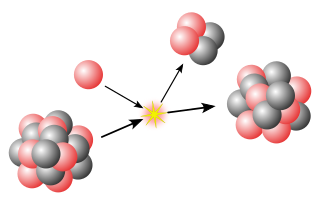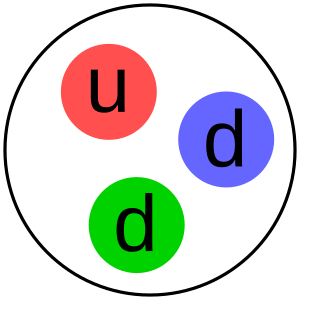Related Research Articles

The European Organization for Nuclear Research, known as CERN, is a European research organization that operates the largest particle physics laboratory in the world. Established in 1954, the organization is based in a northwest suburb of Geneva on the Franco–Swiss border and has 23 member states. Israel is the only non-European country granted full membership. CERN is an official United Nations Observer.
The Helmholtz Association of German Research Centres is the largest scientific organisation in Germany. It is a union of 18 scientific-technical and biological-medical research centers. The official mission of the Association is "solving the grand challenges of science, society and industry". Scientists at Helmholtz therefore focus research on complex systems which affect human life and the environment. The namesake of the association is the German physiologist and physicist Hermann von Helmholtz.

Forschungszentrum Jülich is a member of the Helmholtz Association of German Research Centres and is one of the largest interdisciplinary research centres in Europe. It was founded on 11 December 1956 by the state of North Rhine-Westphalia as a registered association, before it became "Kernforschungsanlage Jülich GmbH" or Nuclear Research Centre Jülich in 1967. In 1990, the name of the association was changed to "Forschungszentrum Jülich GmbH". It has close collaborations with RWTH Aachen in the form of Jülich-Aachen Research Alliance (JARA).
A subcritical reactor is a nuclear fission reactor concept that produces fission without achieving criticality. Instead of sustaining a chain reaction, a subcritical reactor uses additional neutrons from an outside source. There are two general classes of such devices. One uses neutrons provided by a nuclear fusion machine, a concept known as a fusion–fission hybrid. The other uses neutrons created through spallation of heavy nuclei by charged particles such as protons accelerated by a particle accelerator, a concept known as an accelerator-driven system (ADS) or accelerator-driven sub-critical reactor.

The ISOLDE Radioactive Ion Beam Facility, is an on-line isotope separator facility located at heart of the CERN accelerator complex on the Franco-Swiss border. The name of the facility is an acronym for Isotope Separator On Line DEvice. Created in 1964, the ISOLDE facility started delivering radioactive ion beams to users in 1967. Originally located at the SynchroCyclotron accelerator, the facility has been upgraded several times most notably in 1992 when the whole facility was moved to be connected to CERN's ProtonSynchroton Booster (PSB). Entering its 6th decade of existence, ISOLDE is currently the oldest facility still in operation at CERN. From the first pioneering ISOL beams to the latest technical advances allowing for the production of the most exotic species, ISOLDE benefits a wide range of physics communities with applications covering nuclear, atomic, molecular and solid-state physics, but also biophysics and astrophysics, as well as high-precision experiments looking for physics beyond the Standard Model. The facility is operated by the ISOLDE Collaboration, comprising CERN and fifteen (mostly) European countries. As of 2019, more than 800 experimentalists around the world are coming to ISOLDE to perform typically 45 different experiments per year.

E.ON SE is a European electric utility company based in Essen, Germany. It runs one of the world's largest investor-owned electric utility service providers. The name comes from the Greek word aeon which means age. The company is a component of the Euro Stoxx 50 stock market index, DAX stock index and a member of the Dow Jones Global Titans 50 index.
The Framework Programmes for Research and Technological Development, also called Framework Programmes or abbreviated FP1 to FP9, are funding programmes created by the European Union/European Commission to support and foster research in the European Research Area (ERA). Starting in 2014, the funding programmes were named Horizon.

KATRIN is a German acronym for an undertaking to measure the mass of the electron antineutrino with sub-eV precision by examining the spectrum of electrons emitted from the beta decay of tritium. The experiment is a recognized CERN experiment (RE14). The core of the apparatus is a 200-ton spectrometer. In 2015, the commissioning measurements on this spectrometer were completed, successfully verifying its basic vacuum, transmission and background properties. The experiment began running tests in October 2016. The inauguration took place 11 June 2018, with the first tritium measurements by the experiment. The projected experiment duration at the time was 5 years. The first science measurements took place 10 April 2019.

The AVR reactor was a prototype pebble bed reactor, located immediately adjacent to Jülich Research Centre in West Germany, constructed in 1960, grid connected in 1967 and shut down in 1988. It was a 15MWe, 46 MWt test reactor used to develop and test a variety of fuels and machinery.

Isotopes are variants of a particular chemical element which differ in neutron number, and consequently in nucleon number. All isotopes of a given element have the same number of protons but different numbers of neutrons in each atom.

A neutron research facility is most commonly a big laboratory operating a large-scale neutron source that provides thermal neutrons to a suite of research instruments. The neutron source usually is a research reactor or a spallation source. In some cases, a smaller facility will provide high energy neutrons using existing neutron generator technologies.
The Karlsruhe Nuclide Chart is a widespread table of nuclides in print.
The Ernst Ruska-Centre for Microscopy and Spectroscopy with Electrons (ER-C) is an institute located on the campus of Forschungszentrum Jülich belonging to the Helmholtz Association of German Research Centres. It comprises three divisions: ER-C-1 “Physics of Nanoscale systems”, ER-C-2 “Materials Science and Technology” and ER-C-3 “Structural Biology”.
SUPRENUM was a German research project to develop a parallel computer from 1985 through 1990. It was a major effort which was aimed at developing a national expertise in massively parallel processing both at hardware and at software level.
fromAtoB.com was an intermodal journey planner and online booking platform for European travel, accessible via a web browser or mobile apps for Android and iOS. All relevant means of transportation such as train, airplane, bus, and carpool could be compared and combined within one trip. The company was founded in 2008, and was based in Berlin with an office in Aachen. Service ended on December 31, 2020 due to loss of revenue because of the COVID-19 pandemic, while AllRail, a trade association, attributes it to lack of real time data provided by european state railways.

Sekhar Basu was an Indian nuclear scientist who served as the chairman of the Atomic Energy Commission and Secretary to the Government of India, Department of Atomic Energy (DAE). He also served as the Director of Bhabha Atomic Research Centre (BARC), the Project Director of Nuclear Submarine Program and later as the Chief Executive of the Nuclear Recycle Board at BARC. He was a recipient of India's fourth highest civilian honor Padma Shri in 2014.
Sci-Hub is a shadow library website that provides free access to millions of research papers and books, without regard to copyright, by bypassing publishers' paywalls in various ways. Sci-Hub was founded by Alexandra Elbakyan in 2011 in Kazakhstan in response to the high cost of research papers behind paywalls. The site is extensively used worldwide. In September 2019, the site's owners said that it served approximately 400,000 requests per day. The number of articles claimed is frequently updated on the site's home page, being over 85 million in February 2021.

Uniper SE [ˈjuːnipɚ] is an energy company based in Düsseldorf, Germany. The name of the company is a portmanteau of "unique" and "performance" given by long term employee Gregor Recke. Uniper was formed by the separation of E.ON's fossil fuel assets into a separate company that began operating on 1 January 2016. The company employs about 11,000 employees in over 40 countries. Around one third of the employees are based in Germany. It owns a subsidiary company in Russia called Unipro. Uniper is listed at the Frankfurt Stock Exchange. Its largest shareholder is the Finnish energy company Fortum with a 75.01% stake. The company has faced criticism for opening new coal fueled power plants in Germany as recently as May 2020.
Brexit and arrangements for science and technology refers to arrangements affecting scientific research, experimental development and innovation that are within the scope of the negotiations between the United Kingdom and the European Union on the terms of Britain's withdrawal from the European Union (EU).
The European Open Science Cloud (EOSC) is a European Commission initiative aiming at developing an infrastructure providing its users with services promoting open science practices. Besides being open science oriented, the envisaged infrastructure is built by aggregating services provided by several providers following a System of systems approach.
References
- 1 2 3 4 EU Science Hub (2016).
- ↑ Masterson (2017), 6.24 Online Decay Engines.
- ↑ Magill et al. (2009), Abstract.
- ↑ Cern (2017).
- ↑ Excelsior (2015).
- ↑ Forschungszentrum Jülich (2017), p. 251.